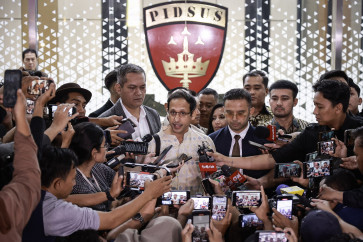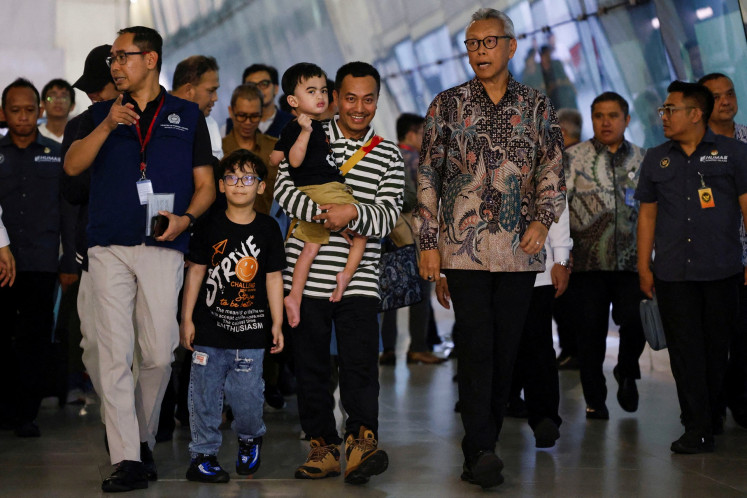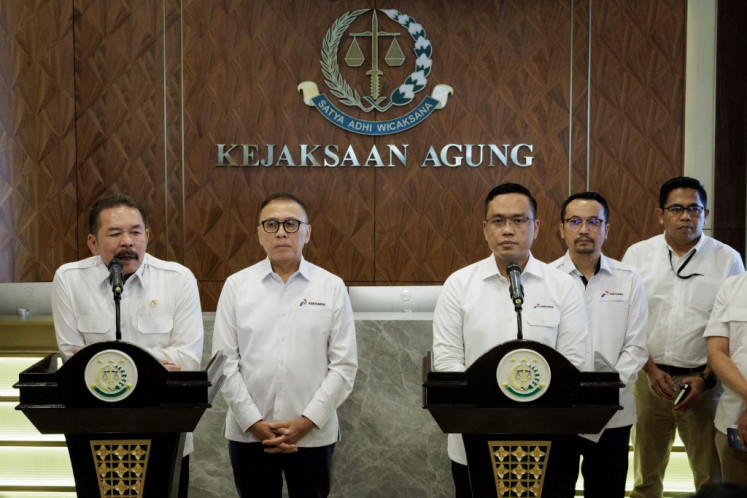Popular Reads
Top Results
Can't find what you're looking for?
View all search resultsPopular Reads
Top Results
Can't find what you're looking for?
View all search resultsCity thrash metal gets popular
“I will occupy, I will help you die, I will run through you, now I rule you too,” Troy, Oracle’s vocalist, croons
Change text size
Gift Premium Articles
to Anyone

“I will occupy, I will help you die, I will run through you, now I rule you too,” Troy, Oracle’s vocalist, croons.
It was Sunday night, but most of the audience had seemed to have forgetten that they had work the next day. They sang along with Oracle to one of Metallica’s biggest songs “Master of Puppets”.
That song was supposed to be the last song in “Thrash Zone 2: The Big Four”, a tribute to the big four thrash bands: Metallica, Megadeth, Slayer and Anthrax. But everyone at MU Café craved an encore. Oracle was the last band and responsible for playing Metallica’s tunes.
Metal freaks know several subgenres in their music such as death metal, progressive metal, black metal and thrash metal, among others. The last one is what Oracle believes to be their destiny.
It is a subgenre of heavy metal with a fast tempo, aggressive lyrics and sound. Of course, most of those characteristics are what most metal sounds like, but to make it easy to understand what thrash metal sounds like, just listen to early Metallica.
“Oracle” is actually a Greek term that means wise teacher, the one that the Greek warriors came to when they feel depressed. The band uses this name because they wanted to share their vision and philosophy with the audience.
In 2000, brothers Mahendra (drum) and Jimmy (guitar), college students in Australia, were heavily influenced by industrial music – “Nine Inch Nails to be specific. We also played some Japanese music back then, but when we played at some thrash gigs, we felt at home, back to the roots,” said Mahendra.
Two years later, they returned to Indonesia and met the rest of the band members. Along with Troy (vocal), Bayu (bass) and Wisnu (guitar), the brothers shared the same passion for thrash metal. The band has already got three albums, one mini album and three singles to date.
In 2010, they had the honor to be the opening act for Exodus, one of the biggest thrash metal bands. “It is quite difficult to find thrash metal bands in Jakarta, maybe that’s why they [the event organizer] invited us,” Jimmy said.
The Internet also makes it easy for bands to promote their music.
“We got our album bootlegged in Malaysia, Taiwan and some countries in Europe. A European even put us on YouTube because he thought that we and some other bands represented the old school thrash metal,” Troy said.
Oracle doesn’t mind the piracy because they think that in the future music albums will be free. “Feel free to bootleg us, just take it for granted. If we want money, we can get it from gigs and merchandise sales,” Jimmy said.
The appearance of most bands and audience at the venue may strike fear in the heart of anyone who sees them on the road. Most of the men have long hair and wear black T-shirts and boots, the women have their hair colored with bright colors and wear punk outfits.
With these clothes, loud music and frightening lyrics, it is easy to assume that the thrash metal community consists of plainly mad people.
However, contrary to such an assumption, they help the people who fall during moshing and they instantly pose whenever they see a camera aimed at their faces. In fact, it is quite difficult to get serious answers from the band, especially Troy.
Being a non-mainstream musician means that you have to find another job to make a living, especially when you are married and already have some children. Bayu and Wisnu have a music studio in Cilandak, South Jakarta, and Troy works at a music store in Depok.
The founding members’ job has nothing to do with music. Mahendra works as an architect, and Jimmy is a graphic designer.
Most musicians have a hard time explaining their passion to their family members. According to Oracle, they rarely spot family among the audience, but they added that their families supported them in other ways.
“As long as we earn something from our hobby, they don’t mind,” Mahendra said.
Living the life of an underground musician is very challenging. In Indonesia, the values that were held by this underground community seem to be unacceptable in society. However, when you’re in a band like Oracle, you will be granted an ability to ignore those negative opinions while still enjoying your normal life.









